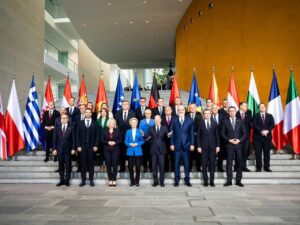
Agrofirma Troyan (Kyiv) has announced that it will hold an extraordinary general meeting of shareholders remotely (by poll).
According to a statement in the regulated information disclosure system, voting will take place by submitting ballots to the depositary institution: the start of ballot acceptance is December 22, 2025 (11:00 a.m.), and the end of registration and voting is December 30, 2025 (6:00 p.m.).
The agenda of the meeting includes, in particular, the election of a counting commission, amendments to the charter and approval of the new version of the charter, as well as approval of the property rights purchase and sale agreement (taking into account the amendments) concluded by the company with Akroninvest LLC.
The company also reported that the previously submitted notice of the meeting, posted on December 11, was withdrawn due to technical errors, after which a corrected notice was published in the information disclosure system.
PJSC Agrofirma Troyan (EGRPOU code 03359658) was registered on September 20, 2001, in Kyiv, with a charter capital of UAH 53.03 million. The head of the company is Petro Vakulchuk. The main activity according to the Classification of Economic Activities is the organization of building construction; other activities include real estate transactions and construction. According to the registers, the ultimate beneficial owner is Vasyl Khmelnytsky.

Cherkasy Chemical Fiber PJSC (Cherkasy) will hold a remote extraordinary general meeting of shareholders on December 24, 2025, according to a statement from the company.
According to the notice, voting will take place by sending ballots to the depositary institution, with a deadline for submission of 6:00 p.m. on December 24.
The agenda includes, in particular, the election of a counting commission, the approval of a package of additional agreements with Sens Bank JSC to the credit line agreement and security agreements, as well as the granting of powers to conclude further additional agreements on these documents. In addition, the shareholders plan to terminate the powers of the current members of the supervisory board ahead of schedule and elect a new supervisory board through cumulative voting.
Cherkasy Chemical Fiber is the only manufacturer of viscose textile yarns in Ukraine. The key operating unit of Cherkasy Chemical Fiber is the Cherkasy Thermal Power Plant, which heats and supplies hot water to most of the city.
Cherkasy Chemical Fiber, SHAREHOLDERS, shareholders' meeting

On Monday, December 22, there will be no precipitation in Ukraine, with only light rain and wet snow in some parts of the northeast during the day, according to the Ukrainian Hydrometeorological Center. Most western, central, and southern regions will experience fog at night and in the morning. The wind will be predominantly northwesterly, 3-8 m/s.
The temperature at night will range from 2°C to 3°C below zero, and during the day from 0°C to 5°C; in Zakarpattia and the south of the country, the temperature at night will range from 0°C to 5°C, and during the day from 3°C to 8°C.
There will be no precipitation in Kyiv on Monday. The wind will be northwesterly, 3-8 m/s. Temperature at night around 0°C, during the day 1-3°C.
According to data from the Boris Sreznevsky Central Geophysical Observatory, the highest daytime temperature in Kyiv on December 22 was 10.0°C in 1989, and the lowest nighttime temperature was -20.2°C in 1967.
On Tuesday, December 23, there will be no precipitation in Ukraine, with only light wet snow in the south-west of the country during the day (with rain in Zakarpattia and Odesa regions) and icy roads in some places. The wind will be mainly from the north, 3-8 m/s.
Temperatures at night and during the day will range from -3°C to +2°C (during the day in Zakarpattia and the south of the country, +1-6°C).
No precipitation in Kyiv on Tuesday. Winds will be mainly from the north at 3-8 m/s. Nighttime temperatures will range from 0 to 2° below zero, and daytime temperatures will range from 0 to 2° above zero.

Passenger traffic across the Ukrainian border in the third week of December, from December 13 to 19, jumped by 26.3% to 562,000 as Christmas approached, and this weekend the increase reached 50%, causing queues at the border with Poland, Hungary, and Slovakia, according to data from the State Border Service.
According to them, the number of border crossings for departure increased to 279,000 from 226,000 a week earlier, while the increase for entry was even more significant – to 283,000 from 219,000.
This Saturday, December 20, the number of border crossings for exit and entry was also similar – 62,000 and 63,000, compared to 41,000 and 39,000, respectively, on the previous Saturday.
The number of vehicles that passed through checkpoints this week also jumped to 140,000 from 123,000 a week earlier, while the flow of vehicles carrying humanitarian cargo remained at around 520.
According to the State Border Service, as of 12:00 on Sunday, there were no queues at the border with Romania and Poland, while at the borders with three other countries, there were queues at all checkpoints.
At the border with Poland, most passenger cars and buses were waiting to cross at the Krakovets checkpoint – 150 and 20, respectively. The queue at the Ustyluh checkpoint consisted of 125 cars and 15 buses, at the Rava-Ruska checkpoint – 110 cars, Smilnytsia checkpoint – 85 cars and 6 buses, Shehyni checkpoint – 80 cars and 19 buses, Hrushev checkpoint – 80 cars and 9 buses, Nizhankovychi checkpoint – 80 cars and 1 bus, Ugrinov checkpoint – 75 cars and 9 buses, Yagodin checkpoint – 30 buses (passage of passenger cars is temporarily suspended).
Forty passenger cars and two buses were waiting to cross the border with Slovakia at the Uzhgorod checkpoint, and 30 cars were waiting at the Maly Berezny checkpoint.
At the border with Hungary, the longest queues were at the Luzhanka and Dzvinovo checkpoints, with 50 and 45 cars, respectively. There were 30 cars at the Kosino and Vilok checkpoints and 5 at the Tisa checkpoint.
The total number of border crossings this week is slightly lower than last year. At that time, 294,000 people left Ukraine and 290,000 entered the country over the same 7 days, although the flow of cars was lower – 134,000.
Last year, a 28.1% jump in passenger traffic was recorded this week, and the following week it increased by another 12.5%.
As reported, from May 10, 2022, the outflow of refugees from Ukraine, which began with the start of the war, was replaced by an influx that continued until September 23, 2022, and amounted to 409,000 people. However, since the end of September, possibly influenced by news of mobilization in Russia and “pseudo-referendums” in the occupied territories, followed by massive shelling of energy infrastructure, the number of people leaving has exceeded the number of people entering. In total, from the end of September 2022 to the first anniversary of the full-scale war, it reached 223,000 people.
During the second year of full-scale war, the number of border crossings to leave Ukraine, according to the State Border Service, exceeded the number of crossings to enter by 25,000, during the third year by 187,000, and since the beginning of the fourth year by 203,000.
As Sergei Sobolev, then Deputy Minister of Economy, noted in early March 2023, the return of every 100,000 Ukrainians home results in a 0.5% increase in GDP.
In its July inflation report, the National Bank worsened its migration forecast: while in April it expected a net inflow of 0.2 million people to Ukraine in 2026, it now forecasts a net outflow of 0.2 million, which corresponds to the estimate of the net outflow this year. “Net return will only begin in 2027 (about 0.1 million people, compared to 0.5 million in the previous forecast),” the NBU added and confirmed this forecast at the end of October. In absolute terms, the National Bank estimates the number of migrants currently remaining abroad at about 5.8 million.
According to updated UNHCR data, the number of Ukrainian refugees in Europe as of December 11, 2025, was estimated at 5.311 million (5.331 million as of November 14), and 5.860 million (5.850 million) worldwide.
In Ukraine itself, according to the latest UN data for July this year, there are 3.340 million internally displaced persons (IDPs), compared to 3.757 million in April.

According to Serbian Economist, the next EU-Western Balkans summit is planned to be held in Montenegro on June 5, 2026, Montenegrin media reported, citing sources close to the country’s president’s office.
European Council President António Costa also said he expects the next meeting to take place in Montenegro in June 2026.
According to the Council of the EU, the EU-Western Balkans summits are attended by leaders of EU countries and EU institutions, as well as leaders of six partners in the region: Albania, Bosnia and Herzegovina, Kosovo, Montenegro, North Macedonia, and Serbia.
Commenting on the plans for 2026, Montenegrin President Jakov Milatović said that there are “high expectations” for the meeting in Montenegro in Brussels and that “it should be a summit of results,” first and foremost for Montenegro itself.
By that date, the European Union intends to begin work on an agreement on Montenegro’s accession to the EU.
Regular EU-Western Balkans summits have been held since 2018; the previous summit took place in Brussels in December 2024.
Source: https://t.me/relocationrs/1973

Corum Druzhkivka Machine-Building Plant (Corum DrMZ), part of the Corum Group (DTEK Energy), has manufactured its first support beam, which serves as a support for the mine’s lifting vessel (skip or cage) during scheduled maintenance or repair work, the plant announced on Facebook.
“This is not a serial product or a borrowed solution. The machine builders developed a new type of equipment from scratch, created the design, worked out the technical solutions, and patented them as a utility model. For the company, this is a new product and the result of its own engineering development,” the statement said.
The design is rated for significant loads — up to 60 tons in normal operation and up to 80 tons at maximum, which is important for human safety.
The plant explains that during the work, the beam will temporarily hold the skip in the cross-section of the mine shaft. Built-in hydraulic jacks will allow the vessel to be lifted above the beam structure, creating safe conditions for servicing suspended devices or ropes.
“The beam is not a permanent piece of equipment, but its use will increase safety during routine maintenance and repair work. Currently, the beam is manufactured for use in one of DTEK Energy’s mines, but the mine potentially needs three more support beams — one of the same size and two of a different design,” the company said.
Once its effectiveness has been confirmed, the solution has the potential to be rolled out to other mines.
Korum DrMZ, which relocated from Druzhkivka (Donetsk region) to Dnipro in 2022, in January-September this year, according to YouControl, incurred losses of almost UAH 90 million, compared to a net profit of UAH 4.6 million for the same period last year and slightly lower net sales revenue of UAH 844.6 million.
In January-October, the plant manufactured 336 units of mining equipment, repaired 12 units of equipment, and produced over 821,000 parts.
Corum Group is a leading manufacturer of mining equipment in Ukraine. It is part of DTEK Energy, an operating company responsible for coal mining and coal-fired power generation within Rinat Akhmetov’s DTEK energy holding.